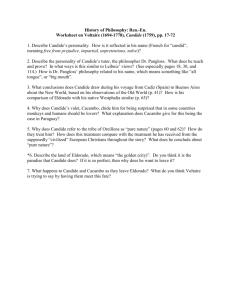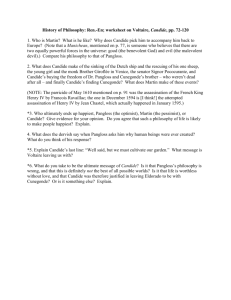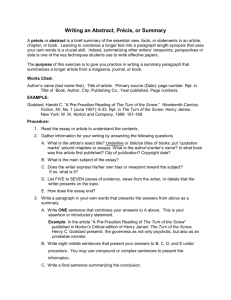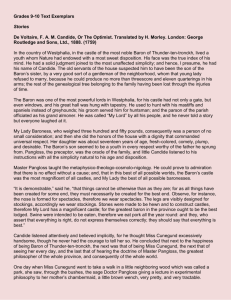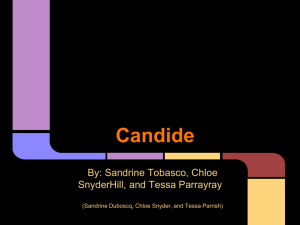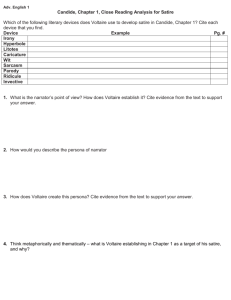03 Voltaire
advertisement
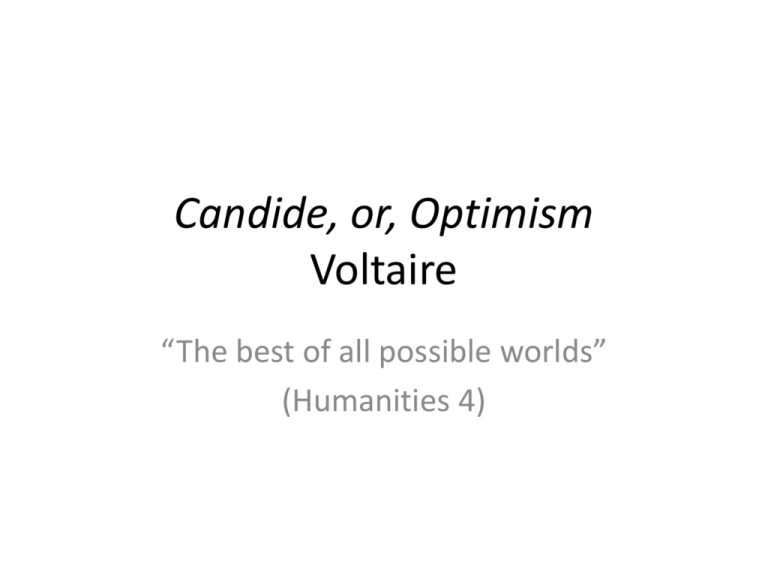
Candide, or, Optimism Voltaire “The best of all possible worlds” (Humanities 4) Voltaire • 1694-1778 • Born François-Marie Arouet – Anagram of APROVET LI, (latinized last name, with initials for “le jejune” or “the younger”) • Connotations of speed & agility • Philosopher & reformer – Freedom of speech & religion, civil rights, anti-torture humanitarian concerns, separation of church & state, religious tolerance • Candide – 1759: Parody of bildungsroman genre 2 Leibnitz • “Optimism” • An ordered, friendly universe – Necessity – Determinism • No free will – God has created the best of all possible worlds • “Evils themselves serve the greater good, and minds only experience pain because it is necessary for them to do so if they are to attain greater pleasures.” (84-86) 3 Candide • Candide – “Candidus” = white, unstained. Honest – “He was not without intelligence, but he was incapable of being devious” • Cunégonde – “Cunnus” = vagina, gonades = ovaries • Dr. Pangloss – Pan = all, glóssa = tongue 4 • “Pangloss taught metaphysico-theologico-cosmolonigology. He demonstrated beautifully that there is no effect without a cause, and that, in this the best of all possible worlds, the castle of His Excellency the Baron was the most beautiful of all castles, and his wife was the best of all possible baronesses. – ‘It can be demonstrated,’ he would say, ‘that things could not be other than they are: for everything has been made to serve a purpose, and so nothing is susceptible to improvement. Just see how noses are designed to support spectacles, and indeed we have spectacles.’” (1-2) • “I’m a philosopher, and it would be inappropriate for me to change my mind.” (75) • Cunégonde sees Pangloss “demonstration” of “cause & effect” with the serving made, attempts the same demonstration w/Candide, which results in his expulsion from the castle – Eden 5 • Candide is press-ganged into the Bulgarian army – “One fine spring day he took it into his head to go for a walk, putting one foot in front of the other, believing it to be a privilege of the human species, as of the various animal species, to make use of one’s legs as one pleases.” • Nature • For this, Candide is punished for desertion, ordered to run 36 gauntlets through 2,000 men – Real event • After being nursed back to health after 2 gauntlets, Bulgars go to war with Abars – Prussia & France (4-5) 6 • “Nothing could be more beautiful, more fine, more glittering, more orderly than the two armies!” – Escaping the battle, Candide finds that they heroes of the Bulgars & Abars have raped & massacred each others villages – War, glory, & human suffering • Candide begs a man, who was lecturing on charity, for food – ‘“My friend,’ said the distinguished speaker to him, do you believe that the pope is the antichrist?’ ‘I’ve never been told that before,’ replied Candide, ‘but whether he is or not, I’m in dire need of food.’ ‘You don’t deserve to eat,’ replied the other; ‘go away you wretch; go away you miserable creature; never come near me again as long as you live.’” • “A person who had never been baptized, an authentic Anabaptist, called Jacques, saw the cruel and shameful way in which one of his fellow human beings was being treated, a creature like him with two legs and no feathers, one with a soul.” (6-9) – Religion, ethics, & suffering 7 • Candide encounters a noseless, syphilitic Dr. Pangloss • The Baron & family are dead, Cunégonde and her brother have been raped to death – ‘If Columbus had not brought back syphilis from the new world, we would have neither chocolate nor cochineal!’ 8 • After Jacques the Anabaptist saves the sailor who punched him, he falls overboard, “in full view of the sailor, who left him to drown without even bothering to watch him go down.” – Pangloss comforts Candide by “proving to him that the Bay of Lisbon had been especially made so that the Anabaptist could drown in it.” • Only Candide, Pangloss, and the brutal sailor survive the ship sinking – The sailor survives the earthquake that destroys Lisbon unscathed (10-12) 9 The Lisbon Earthquake of 1755 • November 1, 9:40am (All Saints’ Day) – ~8.5~9.0 quake – Tsunami – Fires – 85% of Lisbon destroyed • Out of 200,000 residents, 30-40,000 killed • Setback to Portuguese imperial ambitions • Theodicy 10 The Lisbon Earthquake of 1755 • From Voltaire’s “Poem on the Lisbon Disaster”: “And can you then impute a sinful deed To babes who on their mothers' bosoms bleed? Was then more vice in fallen Lisbon found, Than Paris, where voluptuous joys abound? Was less debauchery to London known, Where opulence luxurious holds the throne?” • Rousseau responds that it is better to doubt God’s power than his goodness 11 The Lisbon Earthquake of 1755 • “After the earthquake, which had wrecked three quarters of Lisbon, the wise men of Portugal had identified no more effective method to prevent the rest being destroyed than to hold a fine auto-da-fé to educate the people.” – May actually have happened • “In view of this decision they had arrested someone from Biscay who was convicted of having married his godmother, and two Portuguese who, when eating a chicken, had thrown away the fatty bacon in which it had been wrapped.” (14-15) – Reason & religious tolerance 12 Cunégonde • “‘What! It’s you,” Candide said to her. ‘You’re alive! I’ve rediscovered you in Portugal! Were not raped? Did they not cut your belly open, as Pangloss the philosopher assured me they had?’ – ‘Yes they did,’ said the beautiful Cunégonde, ‘but one doesn’t always die from those two mishaps.’” • The Inquisitor & the Jew – Religious hypocrisy – Science & racism • “Polygenism” (14-18) 13 The Old Woman’s Story • “A hundred times I wanted to kill myself; but I was still in love with life. This ridiculous weakness is perhaps one of our most disastrous attachments; for is there anything more stupid than to choose to carry continuously a burden that at the same time one constantly wants to let drop to the ground? To hate one’s existence, and to cling to it? To stroke the serpent that bites us, until it has eaten our heart out?” – “I am a person of experience, I know the world. Give yourself some fun; require each passenger to tell you their life story; and if you find a single one who has not repeatedly cursed their life, who has not said to themselves over and over again that they are the most unhappy person in the world, throw me in the sea head first.” (25-26) 14 The Second Death of the Young Baron • Candide: “‘I was planning to marry her, and I still hope to do so.’ ‘What insolence!’ replied the baron. ‘Would you have the nerve to marry my sister, whose coat of arms has seventy-two quarterings! I think you’re absolutely shameless to dare talk to me of such an outrageous plan!’” (31) – Against traditional, hierarchical social order 15 Customs & Truth • After shooting the women’s ape lovers – “‘Well perhaps now you will admit that this is fact not fiction,’ said Cacambo, ‘and you can see how people behave when they haven’t been brought up to think as we do.’” (33) • With the cannibals – “‘Don’t forget,’ said Candide, ‘to explain to them how frightful and inhuman it is to cook human beings, and to point out to them how contrary to Christian principles this is.’ ‘Good sirs,’ said Cacambo. ‘I gather you’re planning on eating a Jesuit today. It’s an excellent plan. Eating one’s enemies is a fair and admirable practice.’ (34) • “Mankind is in its natural state good, for these people, instead of eating me, have treated me terribly well since they discovered that I am not a Jesuit.” (35) 16 El Dorado • “‘If we stay here we will never be anybody special; while if we return to our world, even if we take only twelve sheep laden with pebbles from El Dorado, we will be richer than all the kings added together. We will no longer have to fear any inquisitors, and we will easily be able to get back to Miss Cunégonde.’ – Cacambo liked these sentiments. Everyone likes to compete, to make themselves seem important to their friends and relations, to boast about what they have seen on their travels. Candide and Cacambo were happy, but they decided to stop being happy and to ask His Majesty for permission to leave. • ‘You’re making a bad mistake,’ the king said to them. ‘I know my country is nothing special; but when you find yourself in reasonable circumstances, wherever you may be, you should settle down there.’” (41) 17 El Dorado • Which is the best of all worlds? • Which part of the world is best? – Could we be on the worst world in the best of all possible universes? The worst part of the best of all possible worlds? • What if even the best of all possible worlds is intolerable? – Boredom • Why only “reasonable” circumstances? 18 Optimism • “They give us a pair of canvas shorts twice a year, and these are the only clothes we have. When we work in the sugar refineries, and we get one of our fingers caught in the mechanism, they cut the hand off. When we try and escape, they cut a leg off. Both have happened to me. This is the price that has to be paid so that you can eat sugar in Europe.” – Best of all possible worlds: Europe has sugar • “‘Oh, Pangloss!’ cried Candide, ‘you never imagined such an abomination could exist. That’s it; in the end I have no choice but to give up your optimism!’ ‘What’s optimism?’ asked Cacambo. ‘Alas!’ said Candide, ‘it’s the madness that leads one to maintain that all is well when one’s own life is dreadful.’” (43) 19 Martin the Philosopher • A Manichean – “I admit to you that if I look at this globe, or rather at this globule, it seems to me that God has handed it over to some malevolent being—with the exception, of course, of El Dorado.” – “But there is good in the world,” replied Candide. “That may be,” replied Martin, “but I have no experience of it.” (47) – “Well then, for what purpose was the world originally constructed?” asked Candide. “In order to frustrate us at every turn,” replied Martin. (49) • Based on Pierre Bayle – Argued that all of life’s suffering far surpasses its pleasures • Is always right 20 Voltaire on Art • “People say [these paintings by Raphael] are the most beautiful paintings in Italy, but I don’t like them at all. Their color has faded. The bodies seem flat and aren’t threedimensional. The fabrics don’t seem real. In a word, no matter what people say, I don’t think they are a successful imitation of nature herself. I will only love a painting when I find one that makes me think I am looking at real life; there are none that give this illusion. I have lots of paintings, but I no longer look at them.” (63) – Rejects traditional consensus on Raphael’s greatness, uses own critical powers – Conceives of art as a technique to imitate and accurately depict nature • Is this what art is? If not, what is it? 21 Boredom • Cunégonde is regained, but has become horribly ugly – Still thinking herself beautiful, she’s also terribly unpleasant • Candide marries her, but only spite her brother, who again refuses to allow it – He has everything he ever wanted, but it’s all tainted • The old woman: “I should like to know which is worse, either to be raped a hundred times by Negro pirates, to have a buttock cut off, to run the gauntlet in the Bulgar army, to be whipped and hanged during an auto-da-fé, to be dissected, to be a galley slave—in short, to experience all the miseries added together that each one of us has gone through—or alternatively to stay here doing nothing?” – “That’s a tough question,” said Candide. (77) 22 The Dervish • Pangloss: “Master, we come to beg you to tell us why such a strange creature as man was created?” • “What’s it to do with you?” said the dervish. “Is it any business of yours?” – “But Reverend Father,” said Candide, “there is a terrible amount of evil on earth.” • “What does it matter whether there is evil or good on earth? When his highness sends a vessel to Egypt, does he worry whether the rats who are on his ship are comfortable or not?” (78) 23 The Dervish • “So what should one do?” asked Pangloss. • “Keep quiet,” said the dervish. • “I was hoping,” said Pangloss, “to philosophize with you a little about effects and causes, about the best of all possible worlds, about the origin of evil, about the nature of the soul, about the preestablished harmony.” – “On hearing this, the dervish closed his door in their faces.” (78) 24 The Turkish Farmer • “You must have,” Candide said to the Turk, “a vast and magnificent estate?” – “I only have twenty acres,” replied the Turk. “I cultivate them with my children. Work keeps at bay three dreadful evils: boredom, depravity, and poverty.” • Candide, back on his little farm, thought hard about what the Turk had said. He said to Pangloss and Martin: “That old man seems to me to have made for himself a destiny than that of the six kings with whom we had the honor of dining.” (78) 25 • “Let us work without philosophizing,” said Martin, “it is the only way to make life bearable.” – Sometimes Pangloss said to Candide, “All events are linked together in this, the best of all possible worlds; for after all, if you had not been driven out of a beautiful castle, with hefty kicks on your backside, because you loved Miss Cunégonde, if you had not been arrested by the Inquisition, if you had not crossed America on foot, if you had not thrust your sword through the baron, if you had not lost all the sheep you obtained in the good land of El Dorado, you would not be sitting here eating roasted pine nuts and pistachios.” • “That’s well said,” replied Candide, “but we must work our land.” (79) 26

